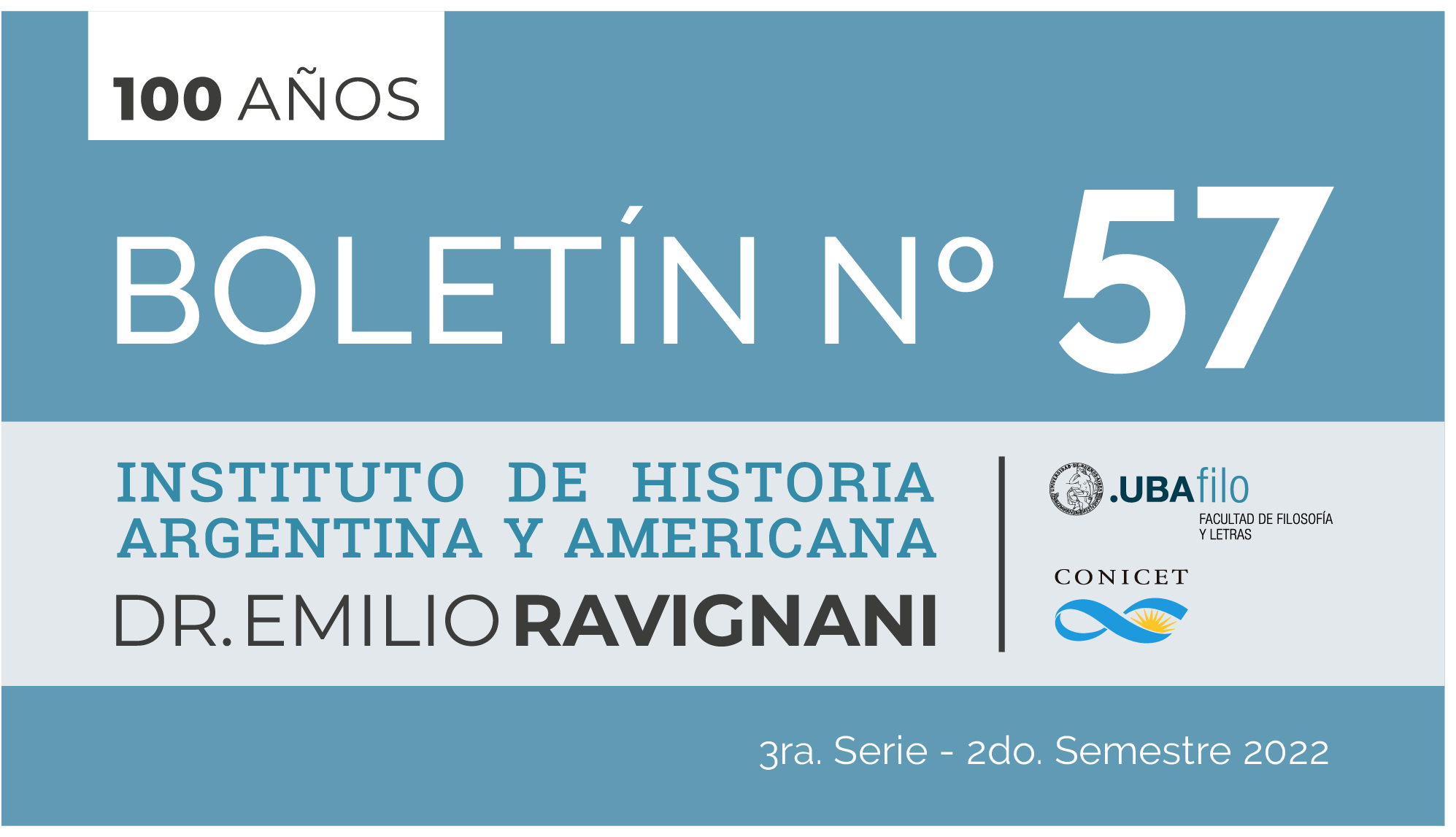European visions of modern dictatorship in the early 19th Century: Dr. Francia in Paraguay
Abstract
To the educated public of the early 19th century, Paraguayan leader José Gaspar Rodríguez de Francia was a figure as mysterious as he was puzzling. The few travelers who came to know him expressed themselves ambivalently about Francia and described his government sometimes admiringly and more often disparagingly as a dictatorship. At the beginning of modernity, for those who dealt with the problem of dictatorship, Francia stood as a symbol of the change in meaning of the term "dictator" from a legitimate, temporary, and therefore positive ruler in an emergency to an illegitimate tyrant. How did European observers perceive Francia? What was the significance of Francia ruling in a region that had just broken away from Spanish colonial rule and declared itself a republic? What were the reasons for the assessment of Francia and what generalizations were associated with it for the entire region and with the dictatorship in general? This paper addresses this question based on published sources on the subject, from Rengger and Robertson to Caldcleugh and others.Downloads
References
Albònico, A. (1991). Alabanzas del Paraguay del Doctor Francia en una revista italiana de 1825. Ricerche Giuridiche e Politiche, Rendiconti V/1: Pensiero e azione del Dr. Francia. Aspetti di diritto pubblico, I, pp. 101-113.
Al’perovič, M. S. (1973). Die südamerikanische Geschichtsschreibung über die Diktatur Francias. Jahrbuch für Geschichte Lateinamerikas, 10, pp. 298-330.
Al’perovič, M. S. (1991). Influencia de los institutos de Roma antigua sobre estructura del estado de Paraguay (1813-1844). Ricerche Giuridiche e Politiche, Rendiconti V/1: Pensiero e azione del Dr. Francia. Aspetti di diritto pubblico, I, pp. 1-11.
Al’perovič, M. S. (1991). La dictadura del Dr. Francia en Paraguay y la opinión pública rusa del siglo XIX. Ricerche Giuridiche e Politiche, Rendiconti V/1: Pensiero e azione del Dr. Francia. Aspetti di diritto pubblico, I, pp. 91-99.
A narrative of facts connected with the change in the political condition and relations of Paraguay, under the directions of Dr. Thomas Francia by an individual who witnessed many of them. (1826). London: W. Mason.
Arato, A. (2013). Conceptual History of Dictatorship (and Its Rivals). En E. Peruzzotti y M. Plot (eds.), Critical Theory and Democracy, pp. 208-80. London: Routledge.
Areces, N. (2007). Estado y frontera en el Paraguay: concepción durante el gobierno del Dr. Francia. Asunción: Universidad Católica.
Báez, C. (1993 [1903]). La tiranía en el Paraguay. Asunción: Nanduti Vive.
Báez, C. (1985). Ensayo sobre el doctor Francia y la dictadura en Sudamérica. Asunción: Cromos.
Beraza, A. (1998). Los Hermanos Robertson, pionera empresa extranjera en Asunción del Paraguay. Montevideo: Centro de Estudios Históricos, Navales y Marítimos.
Bouvet, N. E. (2009). Poder y escritura. El doctor Francia y la construcción del Estado paraguayo. Buenos Aires: Editorial Universidad de Buenos Aires.
Caldcleugh, A. (1825). Travels in South America, During the Years 1819-20-21. 2 vols. London: Roworth.
Cardozo, E. (2010). Paraguay independiente. Asunción: Servilibro.
Carlyle, T. (1843). Dr. Francia. Foreign Quarterly Review, 31, pp. 299-325.
Carreras, S. (1991). El camino solitario de José Gaspar Rodríguez de Francia hacia una Arcadia Sudamericana. Ricerche Giuridiche e Politiche, Rendiconti V/1: Pensiero e azione del Dr. Francia. Aspetti di diritto pubblico, I, pp. 23-40.
Carreras, S. (1992). Del “reino del terror” al “modelo de desarrollo autocentrado”. Las diferentes interpretaciones acerca de la figura histórica del Dictador Supremo del Paraguay, Dr. José Gaspar Rodríguez de Francia. Iberoamericana. Lateinamerika - Spanien – Portugal, 16(45), pp. 13-35.
Catalano, P. (1986). Modelo institucional romano e independencia: República del Paraguay 1813-1870. Asunción: Ediciones Comuneros.
Catalano, P. (1988). Le concept de dictature de Rousseau à Bolivar: essai pour une mise au point politique sur la base du droit romain. En F. Hinard (Ed.), Dictadures (pp. 7-22), París: CNRS.
Chartrain, F. (2013). La iglesia y los partidos en la vida política del Paraguay desde la independencia. Asunción: Centro de Estudios Antropológicos de la Universidad Católica.
Chaves, J. C. (1942). El supremo dictador: biografía de José Gaspar de Francia. Buenos Aires: Difusam.
Clark, E. (1878). A Visit to South America. London: Dean.
Collmer, R. G. (1979). Carlyle, Francia, and their Critics. Studies in Scottish Literature, 14, pp. 112-122.
Coronel, B. (2013). Gaspar Rodríguez de Francia, silencioso precursor del socialismo latinoamericano. Asunción: Cooperativa Universidad Ltda.
Crespo, M. V. (2013). Del rey al presidente: poder Ejecutivo, formación del Estado y soberanía en la Hispanoamérica revolucionaria, 1810-1826. México: El Colegio de México.
Decoud, D. (1901). Atlántida: estudio de la historia americana. Buenos Aires: Spinelli.
Denis, F. (1827). Résumé de l’histoire de Buenos-Ayres, du Paraguay et des Provinces de la Plata suivi du resumé de l’histoire du Chili. París: Lecointe et Durey.
D’Orbigny, A. D. (1839). Malerische Reise in Süd- und Nordamerika. Leipzig: Baumgärtner.
Enríquez Gamón, E. (2011). Francia, un hombre interminable. Asunción: El Lector.
Erskine Norton, E. (1835). Francia, Dictator of Paraguay. New Monthly Magazine, pp. 331-346.
Fournial, G. (1980). Rodriguez de Francia: dictateur “robespierriste” du Paraguay (1814-1840). Annales historiques de la Révolution française, 52(242), pp. 608-614.
Galeano, E. (1975 [1971]). Las venas abiertas de América Latina. México: Siglo XXI.
Gliech, O. C. (1995). Augusto Roa Bastos‘ Roman Yo el Supremo als “Anti-Historie“ oder: Die Rekonstruktion von Geschichte als Mythos und die Grenzen der Historisierbarkeit mythischer Erzählstrukturen. Iberoamericana, año 19, 57 (1), pp. 32-75.
Gómez, L (2009). Iluminados y tránsfugas: relatos de viajeros y ficciones nacionales en Argentina, Paraguay y Perú. Madrid.
Grandsire, R. (1825). Brésil. Journal des débats politiques et littéraires. Sept. 9, pp. 1-2.
Gregory, D. (1992). Brute New World: The Rediscovery of Latin America in the Early Nineteenth Century. London/New York: British Academy Press.
Humboldt, A. von (1825). Briefe aus Paraguay mitgetheilt von Alexander von Humboldt. Hertha: Zeitschrift für Erd-, Völker- und Staatenkunde, 2, pp. 696-707.
Kahle, G. (1964). Ein südamerikanischer Diktator, Dr. Francia von Paraguay, im Spiegel der europäischen Geschichtsschreibung. Saeculum, 15, pp. 249-259.
Kalyvas, A. (2007). The Tyranny of Dictatorship: When the Greek Tyrant Met the Roman Dictator. Political Theory, 35(4), pp. 412-442.
Masterman, G. F. (1870). Seven Eventful Years in Paraguay: A Narrative of Personal Experience Amongst the Paraguayans. London.
Mellet, J. (1959 [1824]). Viajes por el interior de la América Meridional. Santiago de Chile: Ed. del Pacifico.
Métral, A. M. (1829). Essai historique sur la Révolution du Paraguay et le gouvernement dictatorial du Dr. Francia; par MM. De Rengger et Longchamp. Bulletin universel des sciences et de l'industrie. 7. Section: Bulletin des sciences historiques, antiquités, philologie, 11, pp. 103-14.
Millon-Delson, C. (1997). Dictature et despotisme, chez les Anciens et chez les Modernes. Revue Franҫaise D'Histoire des Idées Politiques, 6, pp. 245-251.
Molas, M. A. (1957 [1868]). Descripción histórica de la antigua Provincia del Paraguay. Buenos Aires.
Nagy, A. y Pérez-Maricevich, F. (Eds.) (1969). Paraguay: imagen romántica, 1811-1853. Asunción: Centenario.
Nicolet, C. (2004). Dictatorship in Rome. En P. Baehr y M. Richter (Eds.), Dictatorship in History and Theory: Bonapartism, Caesarism, and Totalitarianism (pp. 263-78). Cambridge: Cambridge University Press.
Nolte, E. (1979). Diktatur. En O. Brunner et al., Geschichtliche Grundbegriffe (vol. 1, pp. 900-924), Stuttgart: Klett Cotta.
O’Leary, J. E. (1944). Glorificación del doctor Francia: la verdad frente a la leyenda negra. Asunción: Imp. Militar.
Paraguay. Neue allgemeine geographische und statistische Ephemeriden (Weimar) (1824), XIV, 3, pp. 241-255.
Parish, W. (1852). Buenos Ayres and the Provinces of the Rio de la Plata. London: Murray.
Pöppig, E. (1838). Paraguay. En Allgemeine Encyclopädie der Wissenschaften und Künste; Sect. 3: O - Z, Theil 11: Panvinius - Parczenzew (pp. 334-359). Leipzig: Brockhaus.
Potthast, B. y Telesca, I. (2012). Paraguay: ¿Nueva jurisprudencia o pragmatismo político? Paraguay y su lucha por mantener la independencia. En J. M. Pérez Collados y S. Barbosa Rodrigues (Eds.), Juristas de la independencia (pp. 521-582). Madrid: Marcial Pons.
Prieto, M. (2018). Dictadura y sentimiento: las emociones en un relato europeo sobre el Doctor Francia, Supremo Dictador del Paraguay. Iberoamericana, 18 (69), pp. 127-150.
Prieto, M. (2020). “History’s so strong”. The Topos of Historia Magistra Vitae and the Re-Discovery of Dictatorship in Latin America. History of Humanities, 5(1), pp. 225-249.
Prieto M. (ed.) (2022). Dictatorship in the Nineteenth Century: Conceptualisations, Experiences, Transfers. New York: Routledge.
Rengger, J. R. y Longchamp, M. (1827). Historischer Versuch über die Revolution von Paraguay und die Dictatorial-Regierung von Dr. Francia. Stuttgart: Cotta.
Rengger, J. R. (1835). Reise nach Paraguay in den Jahren 1818 bis 1826. Aarau: Sauerländer.
La République de Buenos-Ayres telle qu‘ell est aujourd’hui. (1825). París.
Ribeiro, A. (2011). Gaspar Rodríguez de Francia: el hombre de la Independencia y el aislamiento paraguayo. Asunción: El Lector.
Rinke, S. (2007). Jesuitenstaat. En F. Jäger (Ed.), Enzyklopädie der Neuzeit (vol. 6, pp. 19-28). Stuttgart: Metzler.
Rinke, S. (2011). Las revoluciones en América Latina: Las vías a la independencia, 1760-1830. México: El Colegio de México.
Rinke, S. (2015). “Perfidies, Robberies and Cruelties”: Latin America and Napoleon in the Age of Revolutions. En U. Planert (Ed.), Napoleon’s Empire: European Politics in Global Perspectives (pp. 128-141). Houndmills: Palgrave.
Robertson, J. P. y Robertson, W. P. (1838). Letters on Paraguay: Comprising an Account of a Four Years‘ Residence in that Republic. London: Murray.
Robertson, J. P. y Robertson, W. P. (1839). Francia’s Reign of Terror: Being the Continuation of Letters on Paraguay. London: Murray.
Sabato, H. (2018). Republics of the New World. Princeton: Princeton University Press.
Sanders, J. E. (2014). The Vanguard of the Atlantic World: Creating Modernity, Nation, and Democracy in Nineteenth-Century Latin America. Durham: Duke University Press.
Schmelz, F. (1981). Paraguay im 19. Jahrhundert: Ein früher Fall dissoziativer Entwicklung. Heidelberg: Esprint.
Schmitt, C. (1921). Die Diktatur: Von den Anfängen des modernen Souveränitätsgedankens bis zum proletarischen Klassenkampf. Berlin: Duncker & Humblot.
Schröter, B. (1989). Paraguay im Spiegel preußischer Nachrichten aus Südamerika 1817-1846. Lateinamerika (Rostock), 24, pp. 88-104.
Viola, A. (2009). El Dr. Francia, defensor de la independencia del Paraguay. Asunción: Servilibro.
Wappäus, J. E. (1867). Die Republik Paraguay geographisch und statistisch. Leipzig: Hinrichs.
Whigham, T. (1991). The Politics of River Trade: Tradition and Development in the Upper Plata, 1780-1870. Albuquerque: University of New Mexico Press.
White, R. A. (1978). Paraguay's Autonomous Revolution 1810-1840. Albuquerque: University of New Mexico Pr.
Williams, J. H. (1969). Dr. Francia and the creation of the Republic of Paraguay (1810-1814). PhD diss. University of Florida at Gainesville.
Williams, J. H. (1979). The Rise and Fall of the Paraguayan Republic, 1800-1870. Austin: University of Texas Press.
Wisner de Morgenstern, F. (1957 [1923]). El Dictador del Paraguay José Gaspar de Francia (prólogo y notas de Julio César Chaves). Buenos Aires.
Copyright (c) 2022 Boletín del Instituto de Historia Argentina y Americana Dr. Emilio Ravignani

This work is licensed under a Creative Commons Attribution-NonCommercial 4.0 International License.
The copyright is transferred to the Boletín, but the authors may retrieve them and reproduce their work in other media or formats by means of a written request to the Editorial Committee. In such cases, the Boletín will be cited as the first publication of the work.
The works are licensed under a Creative Commons Attribution-NonCommercial 4.0 International License, which allows others to share the work with an acknowledgment of their authorship and initial publication in this journal.
Also, by written request to the Editorial Committee of the Boletín, the authors may separately establish additional agreements for the non-exclusive distribution of the version of the work published in this journal (for example, placing it in an institutional repository or publishing it in a book), with an acknowledgement of its initial publication here. No commercial uses are allowed.



















